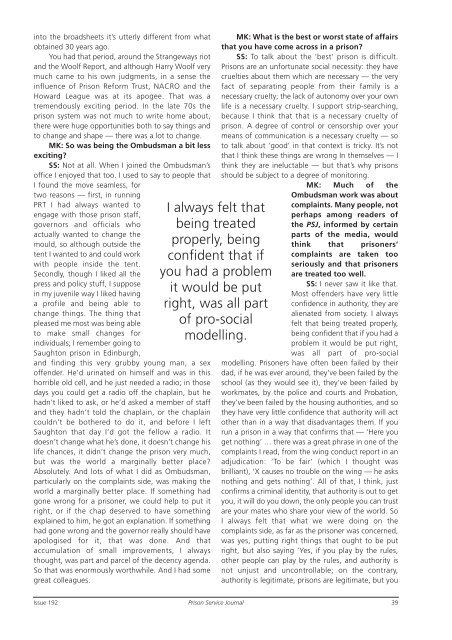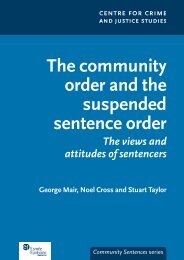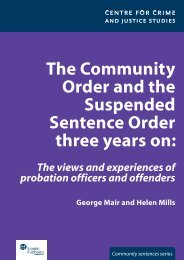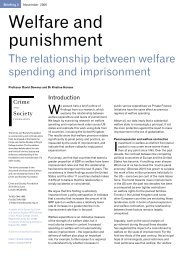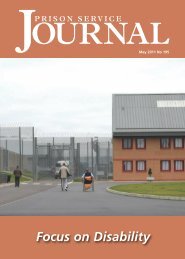PRISON SERVICE
PRISON SERVICE
PRISON SERVICE
- No tags were found...
You also want an ePaper? Increase the reach of your titles
YUMPU automatically turns print PDFs into web optimized ePapers that Google loves.
into the broadsheets it’s utterly different from whatobtained 30 years ago.You had that period, around the Strangeways riotand the Woolf Report, and although Harry Woolf verymuch came to his own judgments, in a sense theinfluence of Prison Reform Trust, NACRO and theHoward League was at its apogee. That was atremendously exciting period. In the late 70s theprison system was not much to write home about,there were huge opportunities both to say things andto change and shape — there was a lot to change.MK: So was being the Ombudsman a bit lessexciting?SS: Not at all. When I joined the Ombudsman’soffice I enjoyed that too. I used to say to people thatI found the move seamless, fortwo reasons — first, in runningPRT I had always wanted toengage with those prison staff,governors and officials whoactually wanted to change themould, so although outside thetent I wanted to and could workwith people inside the tent.Secondly, though I liked all thepress and policy stuff, I supposein my juvenile way I liked havinga profile and being able tochange things. The thing thatpleased me most was being ableto make small changes forindividuals; I remember going toSaughton prison in Edinburgh,and finding this very grubby young man, a sexoffender. He’d urinated on himself and was in thishorrible old cell, and he just needed a radio; in thosedays you could get a radio off the chaplain, but hehadn’t liked to ask, or he’d asked a member of staffand they hadn’t told the chaplain, or the chaplaincouldn’t be bothered to do it, and before I leftSaughton that day I’d got the fellow a radio. Itdoesn’t change what he’s done, it doesn’t change hislife chances, it didn’t change the prison very much,but was the world a marginally better place?Absolutely. And lots of what I did as Ombudsman,particularly on the complaints side, was making theworld a marginally better place. If something hadgone wrong for a prisoner, we could help to put itright, or if the chap deserved to have somethingexplained to him, he got an explanation. If somethinghad gone wrong and the governor really should haveapologised for it, that was done. And thataccumulation of small improvements, I alwaysthought, was part and parcel of the decency agenda.So that was enormously worthwhile. And I had somegreat colleagues.I always felt thatbeing treatedproperly, beingconfident that ifyou had a problemit would be putright, was all partof pro-socialmodelling.MK: What is the best or worst state of affairsthat you have come across in a prison?SS: To talk about the ‘best’ prison is difficult.Prisons are an unfortunate social necessity: they havecruelties about them which are necessary — the veryfact of separating people from their family is anecessary cruelty; the lack of autonomy over your ownlife is a necessary cruelty. I support strip-searching,because I think that that is a necessary cruelty ofprison. A degree of control or censorship over yourmeans of communication is a necessary cruelty — soto talk about ‘good’ in that context is tricky. It’s notthat I think these things are wrong In themselves — Ithink they are ineluctable — but that’s why prisonsshould be subject to a degree of monitoring.MK: Much of theOmbudsman work was aboutcomplaints. Many people, notperhaps among readers ofthe PSJ, informed by certainparts of the media, wouldthink that prisoners’complaints are taken tooseriously and that prisonersare treated too well.SS: I never saw it like that.Most offenders have very littleconfidence in authority, they arealienated from society. I alwaysfelt that being treated properly,being confident that if you had aproblem it would be put right,was all part of pro-socialmodelling. Prisoners have often been failed by theirdad, if he was ever around, they’ve been failed by theschool (as they would see it), they’ve been failed byworkmates, by the police and courts and Probation,they’ve been failed by the housing authorities, and sothey have very little confidence that authority will actother than in a way that disadvantages them. If yourun a prison in a way that confirms that — ‘Here youget nothing’ … there was a great phrase in one of thecomplaints I read, from the wing conduct report in anadjudication: ‘To be fair’ (which I thought wasbrilliant), ‘X causes no trouble on the wing — he asksnothing and gets nothing’. All of that, I think, justconfirms a criminal identity, that authority is out to getyou, it will do you down, the only people you can trustare your mates who share your view of the world. SoI always felt that what we were doing on thecomplaints side, as far as the prisoner was concerned,was yes, putting right things that ought to be putright, but also saying ‘Yes, if you play by the rules,other people can play by the rules, and authority isnot unjust and uncontrollable; on the contrary,authority is legitimate, prisons are legitimate, but youIssue 192Prison Service Journal39


